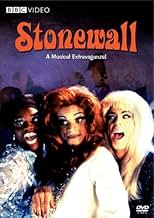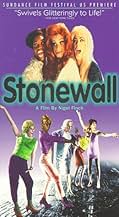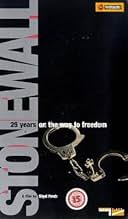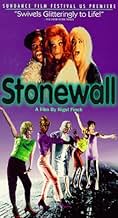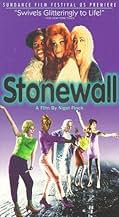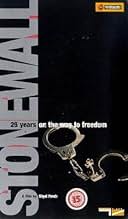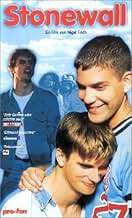IMDb-BEWERTUNG
7,1/10
1821
IHRE BEWERTUNG
Füge eine Handlung in deiner Sprache hinzuA group of homosexual people try to live with dignity and self-respect while events build to the opening battle in the major gay rights movement.A group of homosexual people try to live with dignity and self-respect while events build to the opening battle in the major gay rights movement.A group of homosexual people try to live with dignity and self-respect while events build to the opening battle in the major gay rights movement.
- Regie
- Drehbuch
- Hauptbesetzung
- Auszeichnungen
- 3 Gewinne & 2 Nominierungen insgesamt
Guillermo Diaz
- La Miranda
- (as Guillermo Díaz)
Luis Guzmán
- Vito
- (as Luiz Guzman)
Meg Gibson
- Agnes
- (as Margaret Gibson)
Empfohlene Bewertungen
The night they raided the NYC underground bar Stonewall was the night gay pride exploded into the mainstream. This film tells the story of that night through a group of characters who each shine with their own unique story. There's La Miranda and Matty Dean, the central fictional figures of this film, and their struggle to find love, respect and honour in 1969 against numerous odds. But there are many other important stories told in this beautiful film. Dazzling, bright, strong and rousing are just four words but they settle easily into any sentence describing Stonewall - the movie. Its one of the most colourful and well designed films I've seen - so lush and grand in its set design and the musical numbers blaze. This delicious film is an aching, sweet transport into another time and place and provides a jaunty historical summation of the pride and intensity the name Stonewall still retains in the twentieth century history of the gay experience. Its a love story, a political tale, a drag odyssey and a wonderful expression of the powerful bonds that dark times promote and cement. Most of all, its a film to share with people you care about and want to grow through life with - so march to see it now.
I have a great deal of admiration for this engaging effort to explain the roots of the modern gay rights movement, produced on a shoe-string by a director with an admirable sense of style, pacing, and resourcefulness. Though filtered through a distinctly British class-consciousness, it does a highly respectable job of catching the main trends in gay America from my not-quite-misspent youth.
Furthermore, it is candidly presented as a subjective, fictional account, mooting complaints like "the bus is too old," "no New York apartment is that big" and "the Stonewall bar never looked that clean."
Nonetheless, one small detail and one large item are egregiously wrong. The detail is the rather elementary fact that the Stonewall was never licensed; it was a "private" mob-run club. It was raided not because all cops are homophobes but because, in the absence of official licensing, gay bars were, in every sense, illegal. The scenes where Stonewall employees display great care about the liquor laws are ridiculous, since the bar operated outside the law.
The larger item is the failure to capture the sense of exhilaration that swept throught the country in 1969. This was the year men walked on the moon, the year of Woodstock, the year an X-rated gay-themed film ("Midnight Cowboy") won the "Best Picture" Oscar, and (biggest miracle of all to us New Yorkers) the year the Mets, long "lovable losers," won the World Series. Anything was possible, and gay people joined the party with enthusiasm.
Furthermore, it is candidly presented as a subjective, fictional account, mooting complaints like "the bus is too old," "no New York apartment is that big" and "the Stonewall bar never looked that clean."
Nonetheless, one small detail and one large item are egregiously wrong. The detail is the rather elementary fact that the Stonewall was never licensed; it was a "private" mob-run club. It was raided not because all cops are homophobes but because, in the absence of official licensing, gay bars were, in every sense, illegal. The scenes where Stonewall employees display great care about the liquor laws are ridiculous, since the bar operated outside the law.
The larger item is the failure to capture the sense of exhilaration that swept throught the country in 1969. This was the year men walked on the moon, the year of Woodstock, the year an X-rated gay-themed film ("Midnight Cowboy") won the "Best Picture" Oscar, and (biggest miracle of all to us New Yorkers) the year the Mets, long "lovable losers," won the World Series. Anything was possible, and gay people joined the party with enthusiasm.
The major value of the film Stonewall is to remind all of us just what gay people dealt with before a big rebellion took place in the last week of June in 1969. The film is based on a novel by historian Martin Duberman and the director Nigel Finch died before his testament of the Stonewall Rebellion could be seen and appreciated.
A couple of love stories are involved here. Country boy Frederick Weller arrives from Kansas and he's hoping that New York City will be more accepting of him. Or at least he'll find a community of sorts. That part of the story hasn't ever changed. He's caught between young closeted gay lawyer Brendan Corbalis and professional drag queen Guillermo Diaz.
The second love story is between the owner of the Stonewall Inn and a drag queen played by Bruce MacVittie and Duane Boutte. MacVittie has lived all his life with all the insane rules placed on same sex contact by society and its criminal code against sodomy. Boutte is ready to rebel, but MacVittie counsels go slow it's the way of things in this world. Still he's having just about enough of it.
Weller is a rebellious sort, he gets caught in a bar raid the first night he's in New York. Apparently the concept of freedom in America doesn't extend to those who love of the same sex. He finds the Mattachine Society with their button down ways and it ain't for him. But in a way they do fire his revolutionary ardor.
The Mattachine Society comes in for quite a beating in Stonewall. They were a radical concept in their idea when the mere idea of protesting these laws was radical. In a scene laced with humor and irony Weller is with a group with accompanying press who challenges the law against serving liquor to known homosexuals. Yes there indeed was such a law. The only place that enforces the ordinance is a gay bar because they're afraid of police entrapment.
Of course the end of the film is the riot at the Stonewall Inn which sparked a movement. The unbelievable but true twist on events is the cops including the NYPD's crack tactical police unit equipped for riots retreating into a newly emptied Stonewall Inn for their own safety is truly a sight to behold.
This is a fine film which captures the spirit of that night when it wasn't button down businessmen and lawyers, but rebels in high heels who changed America and the world.
A couple of love stories are involved here. Country boy Frederick Weller arrives from Kansas and he's hoping that New York City will be more accepting of him. Or at least he'll find a community of sorts. That part of the story hasn't ever changed. He's caught between young closeted gay lawyer Brendan Corbalis and professional drag queen Guillermo Diaz.
The second love story is between the owner of the Stonewall Inn and a drag queen played by Bruce MacVittie and Duane Boutte. MacVittie has lived all his life with all the insane rules placed on same sex contact by society and its criminal code against sodomy. Boutte is ready to rebel, but MacVittie counsels go slow it's the way of things in this world. Still he's having just about enough of it.
Weller is a rebellious sort, he gets caught in a bar raid the first night he's in New York. Apparently the concept of freedom in America doesn't extend to those who love of the same sex. He finds the Mattachine Society with their button down ways and it ain't for him. But in a way they do fire his revolutionary ardor.
The Mattachine Society comes in for quite a beating in Stonewall. They were a radical concept in their idea when the mere idea of protesting these laws was radical. In a scene laced with humor and irony Weller is with a group with accompanying press who challenges the law against serving liquor to known homosexuals. Yes there indeed was such a law. The only place that enforces the ordinance is a gay bar because they're afraid of police entrapment.
Of course the end of the film is the riot at the Stonewall Inn which sparked a movement. The unbelievable but true twist on events is the cops including the NYPD's crack tactical police unit equipped for riots retreating into a newly emptied Stonewall Inn for their own safety is truly a sight to behold.
This is a fine film which captures the spirit of that night when it wasn't button down businessmen and lawyers, but rebels in high heels who changed America and the world.
A young gay man from the sticks comes to New York City in 1969 hoping for a better life, but finds the homosexual lifestyle just as stifled in the big city under police pressure, corruption and harassment. The legendary gay riots near the Stonewall Inn take up just five minutes of the film's running-time, the final five minutes. This low-budget, brightly-colored film is more interested in the lives that would soon be affected by the riots than in the aftermath of the violence--and so we get stock characters like the naive blond cowboy, the underworld group controlling the club, the straight-seeming activists for a Homosexual Alliance, and lots and lots of drag queens. Director Nigel Finch seems to make a concerted effort to equate homosexuality with drag behavior, and drag behavior with (ultimately) prostitution. Perhaps this was true of the times, but Finch's presentation (though not campy) has cartoonish leanings and nostalgic overtures that don't express anything more than what most people already realize: the cops were corrupt, the gays were not saints, and they clashed. There's a good movie to be made about Stonewall, but this one just scratches the surface. There are some sweet moments (a sing-along on a bus, a dance between a drag queen and a gay conservative), but just as many scenes where the tone intended hasn't a hope in hell of coming through. ** from ****
"Stonewall" is a fictional but very inspired and moving account of events leading up to and culminating in the famous gay riots in NYC. Don't be fooled by the packaging...this is in no way a fluffy work in the vein of "Can't Stop the Music." It is deeply moving, very nearly tragic as it depicts the complex stressful lives of several characters. Fred Weller is marvelous as the genuine and untried hick Matty Dean who can't accept the comforts of compromise when he knows most of his compatriots are unjustly suffering. Guillermo Diaz as the drag queen La Miranda, who resembles Connie Francis when made-up, is outstanding as Matty's insecure mentor and eventual mate. Hopefully, the rampant police brutality against LGBT persons will be alleviated after the events depicted. I have heard several horrifying stories from a few who were arrested and their subsequent brutal treatment in jails. This film is so well-acted and paced that it should be seen by anyone, gay or straight, who has any interest in basic human rights issues. It will certainly make you think, and doubtless leave a lasting impression and perhaps not a little enlightenment.
Wusstest du schon
- WissenswertesDirector Nigel Finch died of AIDS shortly after completing this, his last film.
- PatzerThe sip-in depicted took place in 1966, not 1969. It was not the Stonewall Inn that refused service, but a bar called Julius (which is shown as the sip-in's first stop in the film).
- Zitate
Princess Ernestine: La Miranda, girl, why do you always put yourself though this?
La Miranda: Why, Princess Ernestine? It's for the sheer, irresistible goddamn glamour of it all.
- VerbindungenEdited into Screen Two: Stonewall (1997)
- SoundtracksAnother Green World
(Arena Theme)
Written and Performed by Brian Eno
Music with permission of BMG Music Publishing Limited
Recording with permission of Virgin Records Limited
Top-Auswahl
Melde dich zum Bewerten an und greife auf die Watchlist für personalisierte Empfehlungen zu.
- How long is Stonewall?Powered by Alexa
Details
- Erscheinungsdatum
- Herkunftsländer
- Sprache
- Auch bekannt als
- Стоунвол
- Drehorte
- Produktionsfirmen
- Weitere beteiligte Unternehmen bei IMDbPro anzeigen
Box Office
- Bruttoertrag in den USA und Kanada
- 692.400 $
- Eröffnungswochenende in den USA und in Kanada
- 74.052 $
- 28. Juli 1996
- Weltweiter Bruttoertrag
- 692.400 $
Zu dieser Seite beitragen
Bearbeitung vorschlagen oder fehlenden Inhalt hinzufügen


